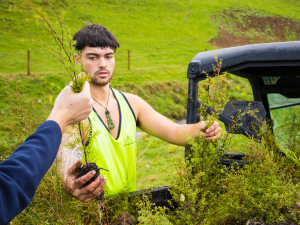Waikato dairy effluent breaches lead to $108,000 in fines
Two farmers and two farming companies were recently convicted and fined a total of $108,000 for environmental offending.
 Trey Newsome from Pūnui River Care working on the council’s two-year Clean Streams 2020 project, which was funded $1.998 million by MPI’s One Billion Trees project to enable landowners in priority catchments across the region, who permanently retire a stream, wetland or seep from grazing, have the retired area planted in native plants at no cost to them. Photo Credit: Waikato Regional Council
Trey Newsome from Pūnui River Care working on the council’s two-year Clean Streams 2020 project, which was funded $1.998 million by MPI’s One Billion Trees project to enable landowners in priority catchments across the region, who permanently retire a stream, wetland or seep from grazing, have the retired area planted in native plants at no cost to them. Photo Credit: Waikato Regional Council
Waikato landowners, supported by Waikato Regional Council, have retired the equivalent of 21 average-sized farms of unproductive land and planted over 3 million trees in the past five years.
The council’s Integrated Catchment Management directorate manages catchments in partnership with landowners to reduce soil erosion, flooding and the amount of sediment getting into waterways, and to improve water quality, river stability and river environments.
One way it does this is to help fund the costs of riparian and hill country fencing and planting.
This voluntary catchment and river restoration work is funded in different ways throughout the region, with funding coming from rates collected and/or by the council applying for funding for various work programmes from other organisations such as Waikato River Authority, the Ministry for the Environment, the Ministry for Primary Industries, the Ministry of Business, Innovation and Employment and the Waikato Catchment Enhancement Trust.
The amount of funding available to landowners depends on whether landowners live in an identified priority catchment or whether the council has secured additional funding for work programmes outside business as usual. It ranges from 35% of costs to 100%, depending on the type of work and funding available, and landowners are able to use their contribution as work in kind.
Waikato and West Coast catchments manager Grant Blackie says the council has financially assisted 1,823 landowners in the past five years, with 80% of the work funded undertaken in prioritised catchments.
“In the Waipā Zone, for example, we have catchments that are predominantly farmland and highly modified which deliver high loads of the sediment to the Waipa River, so we’ve had extra funding available for those landowners through the Waikato River Authority and MPI’s Hill Country Erosion Fund and One Billion Trees,” he says.
“Landowners are doing a phenomenal job taking care of their land and unfortunately we always have more landowners wanting to work with us than we have funding available and there are large areas of the region outside of our priority catchments where only very limited funding is available.”
Blackie says that in the past five years, landowners have retired 5,777ha of land.
“All of this work to retire unproductive land helps to contribute to cleaner water, increased biodiversity and improving the climate resilience of each farm.”
Catchment and river management work for the past five years has also included 1205 kilometres of fencing, to prevent stock access to retired land, and the planting of 3,147,324 plants, mainly native plants but also including smaller numbers of exotic afforestation species and poplar and willow poles.
“And that’s just through us. There are many landowners who fund this type of work alone or make their own applications for funding through other funding sources.”
Blackie says the value of the work completed in the region is conservatively estimated to be approximately $27 million.
Greenlea Premier Meats managing director Anthony (Tony) Egan says receiving the officer of the New Zealand Order of Merit (ONZM) honour has been humbling.
Waikato dairy farmer Neil Bateup, made a companion of the New Zealand Order of Merit (CNZM) in the New Year 2026 Honours list, says he’s grateful for the award.
Another Australian state has given the green light to virtual fencing, opening another market for Kiwi company Halter.
Farmer interest continues to grow as a Massey University research project to determine the benefits or otherwise of the self-shedding Wiltshire sheep is underway. The project is five years in and has two more years to go. It was done mainly in the light of low wool prices and the cost of shearing. Peter Burke recently went along to the annual field day held Massey's Riverside farm in the Wairarapa.
Applications are now open for the 2026 NZI Rural Women Business Awards, set to be held at Parliament on 23 July.
Ravensdown has announced a collaboration with Kiwi icon, Footrot Flats in an effort to bring humour, heart, and connection to the forefront of the farming sector.

OPINION: The release of the Natural Environment Bill and Planning Bill to replace the Resource Management Act is a red-letter day…
OPINION: Federated Farmers has launched a new campaign, swapping ‘The Twelve Days of Christmas’ for ‘The Twelve Pests of Christmas’ to…